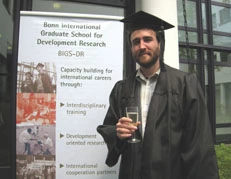Interview with Dr. René Capote-Fuentes

René Capote-Fuentes received his Doctoral Degree on July 12 2007 from the Faculty of Mathematics and Natural Sciences of Bonn University. He has been a doctoral student at ZEF since October 2003. He did research on ecological systems on the south coast of his home country Cuba under the supervision of Prof. Uta Berger (University of Bremen) and Prof. Paul Vlek (ZEF). After his graduation ceremony he found some time to give us an interview .
Dear René Capote, congratulations. Now you have reached the finish of the doctoral marathon, can you remember what your expectations were when you came to ZEF? And have they been fulfilled?
Actually, I was quite curious to assess my academic level on a global scale. Well, I found out that Cuban research in my academic field, ecology, is in quite a good position to engage in wider international cooperation.
Why did you come to ZEF to do your doctoral research in the first place?
After finishing my Master's Degree at the University of Havana in Cuba, I was determined to go abroad for doing my PhD. A colleague of mine recommended me to apply to ZEF. He knew ZEF as an international and interdisciplinary institute with a broad approach to development issues. That sounded attractive to me.
On which topic did you do your PhD research?
I did my thesis on the "Resilience of mangroves on the south coast of Havana province, Cuba" and received my Doctoral Degree from the Faculty of Mathematics and Natural Sciences of Bonn University. My supervisors were Prof. Uta Berger and Prof. Paul Vlek. My closest collaborator was my tutor at ZEF, Dr. Manfred Denich.
One of the countries you focused on in your field research was your home country Cuba. What were your experiences during that time?
Indeed, during my one-year field research I conducted a comparative study on the resilience of mangroves on the south coast of Havana province, Cuba, in Mexico and in the USA. From the USA I used secondary data, whereas from the other locations I collected primary data myself. In all cases I owe a lot to the support of good colleagues and friends.
In fact, I was quite impressed by the amount of knowledge of the local population about their environment. I also enjoyed their way of living, which is usually very simple in infrastructure, but less contaminated by modern styles like those linked to financial issues. Their support was technically and emotionally indispensable for my research. For example, I never missed the aero-spatial-based equipment for finding locations in the field, as long as an experienced farmer or fisherman was with me. It really is my wish that these people benefit from my research in the near future.
What were the main conclusions you drew from your data and knowledge on the mangrove ecosystems in the regions you did your PhD research in?
My main practical conclusion is that there is no need of much new ecological knowledge to slow down the degradation of mangrove ecosystems, and to restore many of them. We know well enough by now that mangroves, together with other wetlands, are world-wide important for human food and water consumption, as well as to flood regulation and coastal protection. We know a lot about the fragile interplay between water and soil levels, enabling the restoration of mangroves that have been degraded. Generally spoken, there is too much focus on science and too little attention for the practical and technical implementation of solutions. This has to change.
What is the "take home" message of your time as a PhD student at ZEF?
I really appreciated the opportunity to get into contact with international colleagues, at the institutional as well as at a more personal level. The doctoral studies program provided me with the possibility to extend my academic network considerably. Besides, I had the opportunity to travel in Europe and to visit Australia.
What are you going to do now after having graduated?
First of all, I intend to return to Cuba and go back to my home Institute of Ecology and Systematics, and to Havana University. One of my priorities will be to remain active at the international level and extend Cuba's international scientific networking activities. And I will also attempt that more is done on implementing knowledge instead of collecting it only.
Dr. Capote, we thank you for this interview and wish you a bright future!

